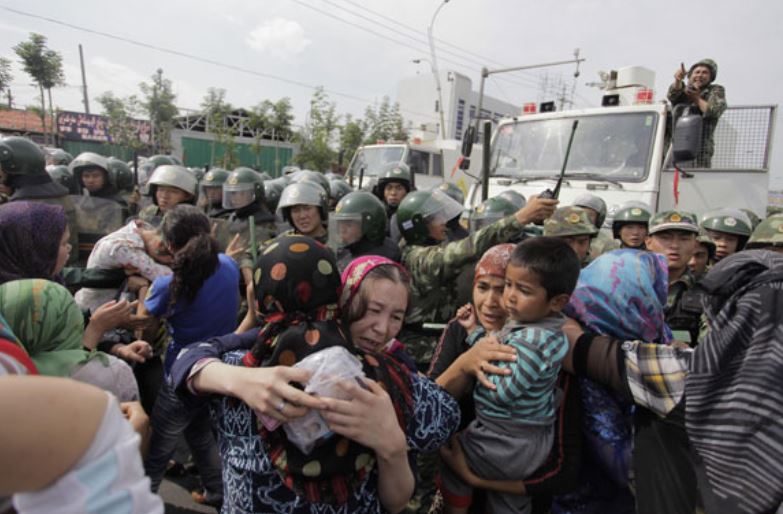
- The CCP has indulged in the persecution of Uyghur Muslims, enforced disappearance, torture, murder, and institutionalized and directed sexual abuse against its ethnic minorities.
- However, China’s tremendous economic power has caused the Global Muslim community to ignore the plight of Uyghur Muslims.
- Beijing has used its economic, geopolitical, and diplomatic influence to force major Muslim countries to sign extradition treaties and deport Uyghurs living in those countries.
China’s President Xi Jinping wields enormous power over the global Muslim community. Through economic interest, trade, and investment relations, China’s Communist Party leader has influenced the Islamic world. China prioritizes energy security and low hydrocarbon prices as the world’s top oil importer, resulting in increased crude oil imports from GCC countries. Significant investments and collaborations in key infrastructure projects, such as the UAE’s industrial city and Saudi Arabia’s Yanbu refinery, reinforce China’s commitment.
The country’s expanding regional diplomacy was obvious in its mediation of the Saudi Arabia-Iran pact, which committed a staggering $400 billion to Iran’s economy over a 25-year period in exchange for subsidized oil delivery. Furthermore, China’s importance as Turkey’s second-largest import partner and active member in the Belt and Road Initiative underscores its importance in regional influence.
Whitewashing Atrocities on Uyghurs
The fact that China’s tremendous economic power has caused the Global Muslim community to ignore the misery of fellow Uyghur Muslims has been a source of concern for human rights activists and many others around the world. Despite mounting evidence of human rights violations in Xinjiang, including the detention of over a million Uyghur people in re-education camps and allegations of forced labour, surveillance, and demographic changes, many Muslim-majority countries have chosen to remain largely silent or even supportive of China’s actions. The Xingjiang province and Uyghur Muslims are subjected to socioeconomic exploitation of indigenous resources, with female captives being malnourished and receiving only 200 grams of potable water per day. Some are paraded in front of shaved-head male police officers.
Uyghur Muslims working in government departments, particularly teachers, are required to pledge “that neither they nor their family will perform namaz (five prayers a day), wear a headscarf, or wear religious clothing,” and to educate their students’ guardians to refrain from performing namaz and participating in other religious activities. Since 2017, namaz (prayers) have been designated an “illegal religious activity,” and Uyghurs have been penalized for conducting this fundamental religious requirement. A public toilet has been built on the site of a demolished mosque in Atush (in Chinese, Atushi) city in northwest China’s Xinjiang Uyghur Autonomous Region (XUAR).
Breach of international law Ignored
The heinous widespread systematic violent torture of civilian Uyghur Muslims is aimed at ethnic cleansing of the indigenous population. This is an obvious breach of international law, as the CCP has been proven to be involved in the persecution of Uyghur Muslims, enforced disappearance, torture, murder, and institutionalized and directed sexual abuse against the Muslim people. The CCP and Chinese government are allegedly involved in illegal organ harvesting of Uyghur Muslims in prison camps, which are then sold to Muslim clientele as “Halal” organs, which fetch three times the price in the international market due to the fact that they do not consume pork.
Instead of outright condemning the heinous atrocities, the joint letter issued by around 30+ Muslim countries (Saudi Arabia, the UAE, Pakistan, Turkey, Malaysia, Iran, and the Central Asian republics) who frequently portray themselves as defenders of Islam and the global Muslim community praised China’s efforts for “protecting and promoting human rights through development” in the province of Xinjiang. Former Pakistan Prime Minister, whose country is the birthplace of global Jihadi terrorism, denied any awareness of the heinous atrocities against Uyghur Muslims. Baloch locals have been protesting against the Chinese trawler mafia destroying the livelihoods of local Muslim Baloch fishermen.
Economic Interests eclipse Human Rights
Beijing has used its economic, geopolitical, and diplomatic influence to force major Muslim countries to sign extradition treaties and deport Uyghurs living in those countries. Turkey, a Muslim country with the largest Uyghur diaspora, has also been diplomatically pressured to sign an extradition deal that its parliament has yet to ratify. Around 682 Uyghurs have been held in Egypt, Indonesia, Kazakhstan, Kyrgyzstan, Pakistan, Qatar, Malaysia, Saudi Arabia, Syria, Tajikistan, Thailand, Turkey, the UAE, and Uzbekistan, while several Muslim nations have detained Uyghur exiles despite the fact that extradition treaties have not been amended. The Eastern Turkistan Islamic Movement (ETIM, afterwards known as Turkistan Islamic Party) is protesting the Chinese government’s atrocities against the Turkic-speaking ethnic majority in Xinjiang.
In a world where economic interests often take precedence over ethical considerations, China’s rising economic power has led to a disheartening silence and complicity among many Muslim nations in the face of the Uighur crisis. Despite the widespread condemnation from activists and scholars, the economic integration with China has allowed President Xi Jinping to wield influence, revealing the unsettling truth that economic considerations can overshadow the plight of the Uighur Muslims within the global Muslim community.
(The author is a post-graduate student in International Relations at Kalinga University, Raipur. The opinions expressed are the author’s own)
Aayush Pal is a freelance writer on contemporary geopolitical developments. The views expressed in his work are entirely his own.
